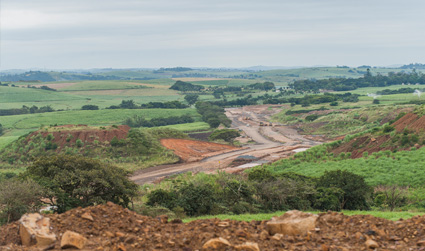
Strategic Environmental Planning“From the very outset, Dube TradePort Corporation has upheld the need for environmental sustainability. In balancing corporate gain and environmental preservation, the organisation is committed socially and environmentally to responsible development,” says Saxen van Coller, Dube TradePort Corporation’s Chief Executive Officer. The organisation has developed a long-term Environmental Strategy that includes its tenants and suppliers in terms of integrated waste, water and energy management and conservation. To account for its environmental impacts, in addition to mandatory environmental compliance monitoring, the organisation undertakes an Annual State of the Environment Report to gain insight into the state of its natural resources. “In addition to all applicable South African environmental legislation, Dube TradePort Corporation, as an organisation, applies international best practice for all development applications,” says Owen Mungwe, Dube TradePort Corporation’s Executive: Development Planning and Infrastructure. Working with key strategic partners and relevant authorities, such as Ezemvelo KZN Wildlife and the Endangered Wildlife Trust, Dube TradePort Corporation has been able to identify key environmental issues and potential mitigation measures. These include environmental stewardship, mitigation off-sets and indigenous landscaping. “Responding to water supply issues and climate change phenomena, Dube TradePort Corporation has developed a Water Demand and Consumption Plan, as well as a Carbon Management Strategy, in addition to its Rehabilitation and Restoration Programme.” “In addition to key strategic partners and relevant authorities, the organisation recognises the importance of innovation and research as pillars of sustainable development. For this, we are working with the University of KwaZulu-Natal’s Department of Environmental Engineering to develop design tools for a Green Industrial Park within the Dube TradeZone precinct,” says Mungwe.
“While this is a new business concept, climate change and the shift towards a ‘green’ economy in South Africa requires a systems approach to development design. We are excited with the potential collective benefits for ourselves, investors, the University and the community,” he says. With a combined 520 hectares of commercial and industrial land to bring to the market in the next five years, Dube TradePort Corporation’s environmental performance is going to be a standard by which the organisational business performance is measured in terms of sustainability indicators. This will also depend largely on the regulatory and statutory approvals for the current Environmental Impact Assessment applications.
|
